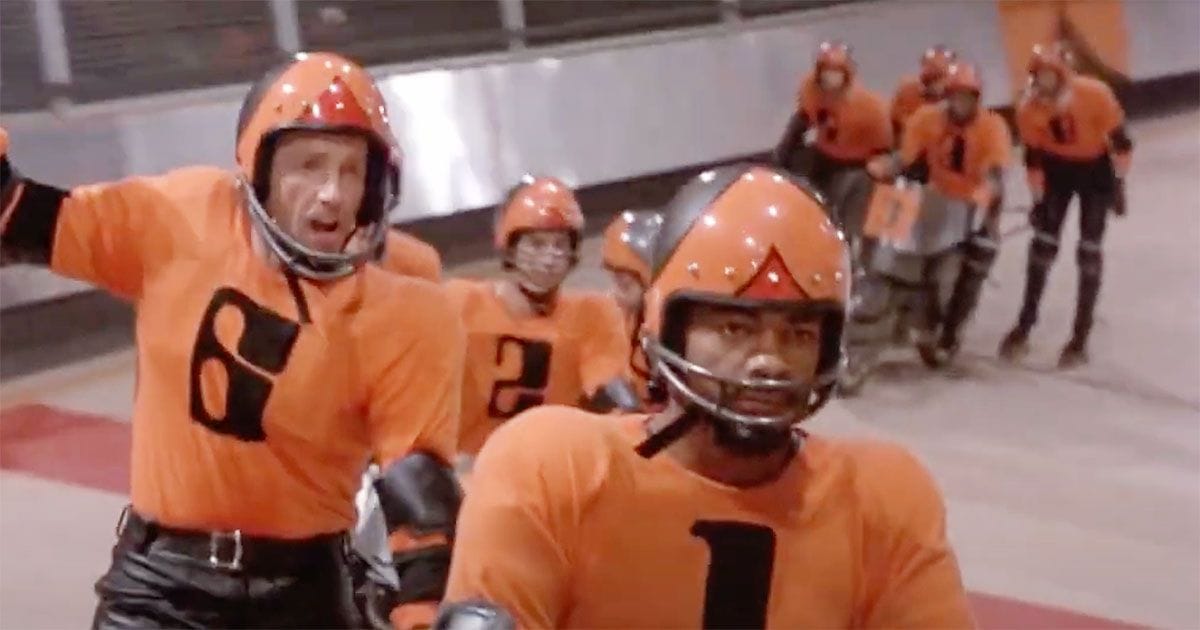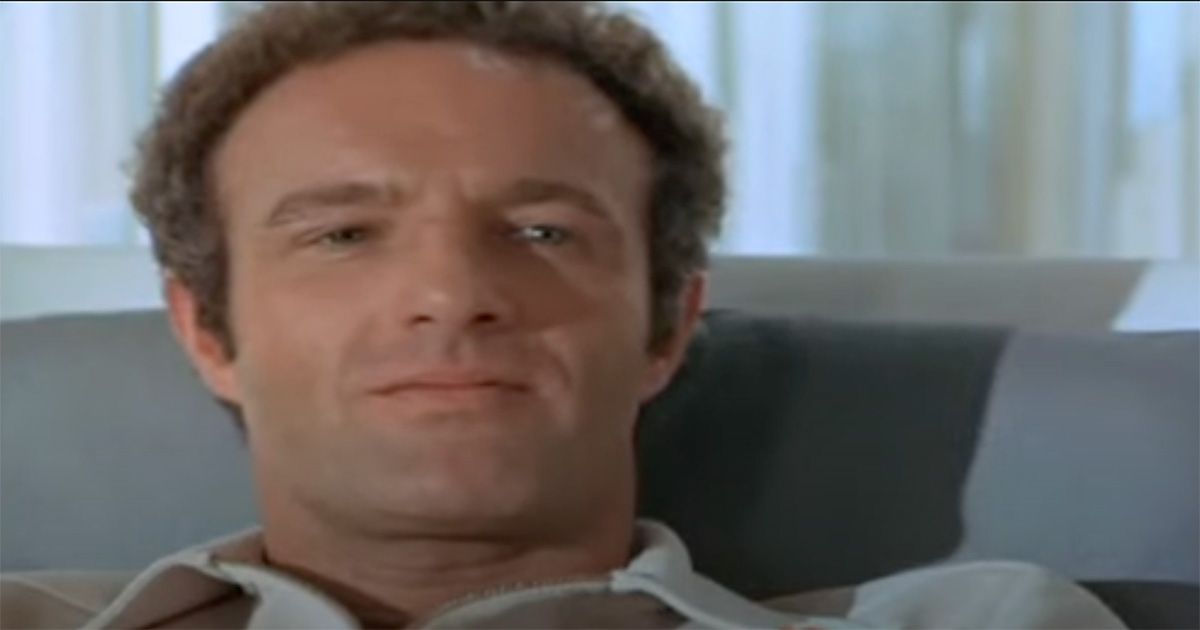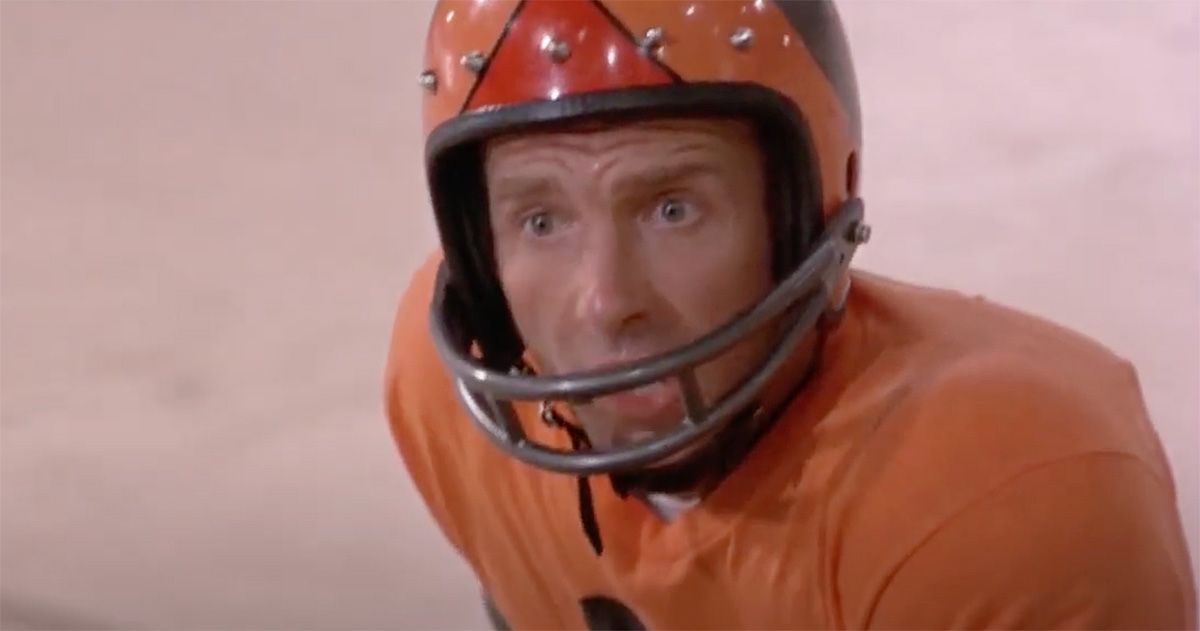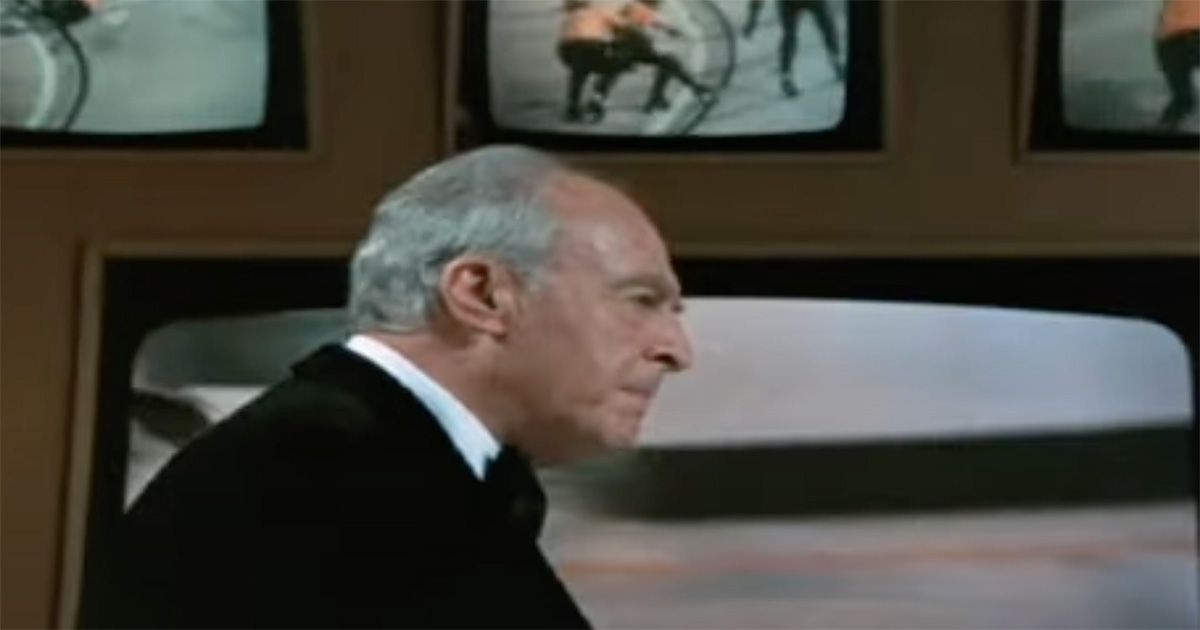Rollerball Is Still a Chillingly Relevant Science Fiction Movie Worth Your Time
Rollerball (1975), directed by Norman Jewison, explores corporate control and individuality in a thrilling dystopian spectacle. Rating: 6.5/10.

Norman Jewison's Rollerball, released in 1975, is a prescient dystopian science fiction movie that explores the consequences of corporate control over society through the lens of a brutal sport.
The screenplay, written by William Harrison, adapts his own short story "Roller Ball Murder," and features a strong cast led by James Caan as Jonathan E., the celebrated star of the Houston Rollerball team. Other notable performances include John Houseman as the scheming corporate executive Mr. Bartholomew, Maud Adams as Jonathan's estranged wife Ella, and Ralph Richardson as the quirky librarian overseeing a world of digitized knowledge.
Set in a future dominated by mega-corporations and devoid of individual freedom, Rollerball presents a gripping commentary on the lengths to which the powerful will go to maintain control over the masses.
The film masterfully juxtaposes high-octane sports action with a chilling examination of societal complacency and the erasure of personal identity. As the story progresses, the film prompts viewers to contemplate the nature of individualism in a world dominated by corporate interests. Rollerball stands as both a thrilling spectacle and a cautionary tale, making it a compelling piece of cinema that remains relevant decades after its release.
| Attribute | Details |
|---|---|
| Title | Rollerball |
| Director | Norman Jewison |
| Writer | William Harrison |
| Actors or Actresses | James Caan, John Houseman, Maud Adams |
| Rated | R |
| Runtime | 125 min |
| Box Office | N/A |
| U.S. Release Date | 25 Jun 1975 |
| Quality Score | 6.5/10 |
Synopsis
In the world of Rollerball, the titular sport serves as both a brutal entertainment spectacle and a tool for the ruling corporations to suppress dissent and unify the populace under a veneer of camaraderie. Jonathan E., an exceptional athlete, initially revels in the admiration that his prowess brings. However, as he discovers the sinister motivations of the corporate entities that control his life, his position of power becomes increasingly precarious.

Impending changes to the sport cast doubt on Jonathan's significance to the game. The executives, eager to tighten their monopoly, target him as an individual whose presence threatens their control over society.
The executives, determined to maintain their monopoly, target him as a symbol of individuality that threatens their absolute dominance over society. As the plot unfolds, Jonathan begins to fight against the corporate machinations that threaten his identity and the very essence of the sport he loves.

Jonathan, surrounded by colleagues forced into submission and a society that values obedience, embarks on a desperate quest for autonomy. Opposing the relentless tide of corporate conformity, he calls into question the value of the human spirit against an unforgiving system designed to stifle creativity and passion.
The film culminates in a harrowing climax, where the true cost of resistance is laid bare amid the chaos of the Rollerball arena, revealing not only the brutality of the sport but also the fragility of personal freedom in the face of an indifferent corporate machine.
Ultimately, Rollerball challenges viewers to reflect on the implications of sacrificing individuality for the sake of entertainment and the hollow promises of a homogenized existence.
Themes
Watching Rollerball is akin to being thrust into a world where violence and spectacle collide against a backdrop of chilling corporate control and individual despair.
The film's visuals are striking, showcasing a meticulously crafted future that feels unnervingly plausible. The stark arenas, filled with electric energy, present the harsh realities of a society that has traded freedom for the allure of entertainment. The cinematography captures the frenetic pace of the sport, allowing the viewer to feel the adrenaline surging with every clash of the athletes—an impressive feat for a film from the mid-1970s.

The film's sound design further amplifies its impact. The roar of the crowd mingles with the relentless music score, creating an atmosphere that envelopes the viewer and immerses them in the adrenaline-fueled world of Rollerball.
The orchestration by the renowned composer Frank W. D. Wells provides an emotional undercurrent that complements the intensity of the action. It resonates deeply, enhancing the feeling of dread that accompanies each moment Jonathan E. faces the ruthless reality of his existence. The unique fusion of sport and theatricality exemplifies the film's core premise of how entertainment can distort human values.
At its heart, Rollerball confronts the immense power wielded by corporations and the consequent erosion of individuality. This theme manifests not only in Jonathan E. as he navigates the treacherous waters of fame but also in the world around him.
The faceless corporations that dictate the terms of existence serve as a grim reminder of how an unyielding system can obliterate personal identity in favor of collective compliance.

The film prompts us to consider the implications of surrendering our autonomy for the convenience of entertainment, raising unsettling questions about the nature of free will in an increasingly corporatized world.
Another prominent theme is the illusion of unity amidst a façade of competition. Rollerball presents a society that advocates for teamwork and cooperation through sport, but those in power ultimately orchestrate this camaraderie to maintain control.
Characters socialized into loyalty and submission are depicted as pawns, their identities eclipsed by the corporation's agenda. They market the game as a tool for unity, but in truth, it only strengthens the status quo, exposing the manipulation woven into its very design.
As Jonathan E. fights against the erasure of his individuality, his struggle becomes emblematic of the human spirit's desire for agency and recognition. Watching him, one cannot help but feel a visceral connection to his plight as he wrestles with the crushing weight of corporate imposition.
The film channels a deep existential sadness juxtaposed against the thrill of the Rollerball matches, stirring within the viewer a reflection on personal values and societal dynamics.

In essence, Rollerball is not merely a sports film but a powerful commentary on the intersection of humanity and system. Its iconic imagery, haunting score, and thought-provoking themes resonate long after viewing, inviting introspection about the state of modern life and the potential dangers posed by ever-growing corporate influence.
The lasting impression it leaves is a profound awareness of the delicate balance between entertainment and personal sacrifice, ensuring that even as the credits roll, the conversation continues.
Who Will Enjoy Rollerball
Rollerball is a film that transcends the boundaries of conventional science fiction, appealing to an array of viewers, especially those who appreciate narratives steeped in social commentary and philosophical inquiry.
While fans of the genre will undoubtedly find the movie engaging, it also attracts those who enjoy thought-provoking cinema, irrespective of their usual preferences. Individuals who are fond of stories that critique the society in which we live will find Rollerball particularly compelling.
You may wish to watch Rollerball on a quiet evening when the weight of the world feels particularly pressing, as its themes about corporate control and the erosion of individuality resonate with contemporary societal dynamics.
It may serve as a refreshing diversion for those who enjoy dynamics rooted in ethical dilemmas, urging viewers to reflect on their own lives and the world around them.
A perfect companion for a gathering of friends seeking intellectual stimulation rather than mere entertainment, the film can spark discussions about the implications of surrendering freedom for the sake of safety—or, more chillingly, for entertainment.
Moreover, those with an interest in sports, violence, or even the evolution of games may find the movie particularly engaging. Rollerball can evoke a sense of nostalgia for traditional sports while simultaneously raising critical questions about where such pastimes could lead if left unchecked by moral considerations.

This juxtaposition between enjoyment and ethical duty invites a re-examination of not just entertainment but also the role of individual agency within a broader social framework.
Reflecting upon the overall impression of Rollerball, one must acknowledge that it is not simply an entertaining spectacle but a cautionary tale that is increasingly relevant today.
The film is steeped in an atmosphere of foreboding, culminating in a visceral experience that resonates long after the screen fades to black. The haunting melodies and dynamic visuals remain with the viewer, reminding us of the allure and dangers of our contemporary landscapes.
The film successfully blends high-octane sports action with chilling political commentary, making it an essential viewing for anyone seeking to understand the parallels between fiction and reality.
By examining the consequences of corporate dominance and the loss of individuality, Rollerball offers not only entertainment but also a poignant reflection on what it means to be human in an increasingly mechanized world. Thus, it is a film worth seeing, both for its artistry and its profound insights.

